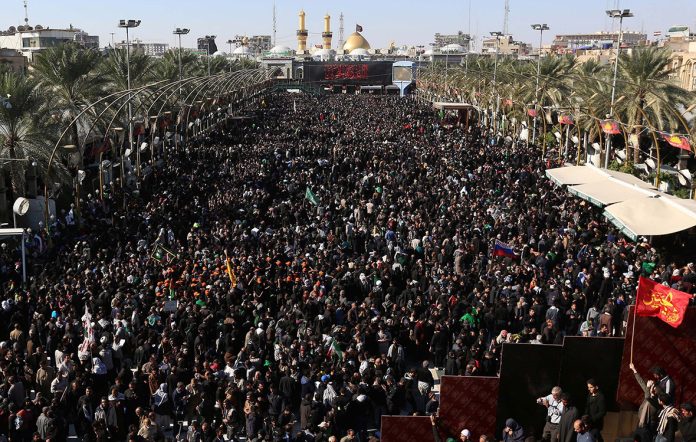An estimated 20 lakh Shiite pilgrims thronged Iraq’s holy city of Karbala on Monday to mark the annual Arbaeen commemoration, as Baghdad looks to wipe out the Islamic State group that has targeted their branch of Islam.
Arbaeen is one of the biggest religious festivals on earth and marks the end of the 40-day mourning period for the 7th-century killing of Imam Hussein by the forces of the Caliph Yazid — a formative event in Shiite Islam.
Under tight security, around 20 lakh worshippers crowded into the golden-domed mausoleum where the Prophet Mohammed’s grandson is buried, Karbala’s religious authorities said, beating their chests in unison against a background of religious music.
Imam Hussein’s killing in the Battle of Karbala in 680 AD was part of a fierce dispute over who should succeed the Prophet, which eventually developed into a bitter schism between the Sunni and Shiite branches of Islam.
Iraqi Prime Minister Haider al-Abadi said the security operation to protect the millions of pilgrims was a “success” and “another victory” for Iraqi forces who have routed IS from most of the country.
Read more: Iraqis find joy in serving pilgrims on the road to Karbala
Believers from across the Middle East and beyond made the pilgrimage to Karbala.
Shiites make up some 60 per cent of Iraq’s population.
More than two million Iranian pilgrims also crossed the border into Iraq for Arbaeen, an Iranian official said.
“There are pilgrims coming from Arab countries, from Turkey, from the US, the Gulf, from everywhere in the world, and this is proof that Muslims all over the world are united,” said Shia al-Mussawi, a pilgrim visiting from Iraq’s Misan province.
Along hundreds of kilometres of road leading to Karbala, thousands of volunteers greeted the pilgrims, most of whom walked to the Imam Hussein shrine, to offer food, drink, and a variety of services.
Behrouz Mahdavi, a pilgrim from Iran, brought with him a six-metre-long tent in which he invited pilgrims aching from the long walk to rest while he massaged their feet.
Calling themselves “servants of Imam Hussein” these volunteers took pride in preparing tea for the pilgrims, handing out water bottles, some dates, or even home-cooked meals for the hungry.
Tahsin Jundi al-Hassan and Ahmed Rahim set up a “taxi service” offering pilgrims a free ride on a wooden cart for the last few kilometers to the shrine.














